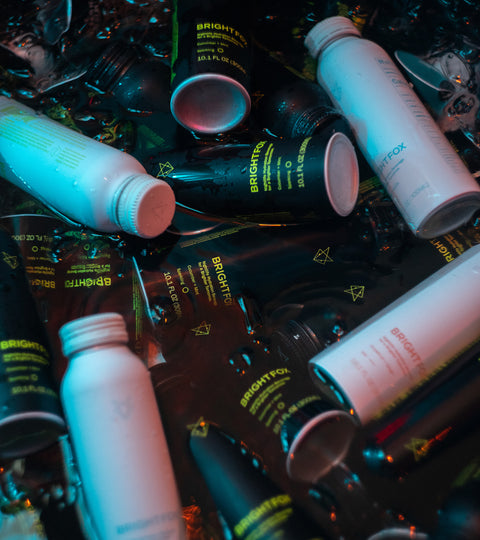Aluminum
What is Aluminum?
Reducing waste and plastic consumption to combat climate change is truly the task of the century. A seemingly small part of that involves evaluating our lifestyle choices. Plastic, glass, aluminum — which material is the most eco-friendly?
Although the answer isn’t quite straightforward, one material stands out: aluminum. Keep reading to learn how this lightweight metal has the potential to transform the food and beverage industry and cut carbon emissions in the process.
A more sustainable alternative to glass and plastic
Production, transport, weight, degradability, recyclability — when discussing a material’s sustainability, one must consider an array of factors. This complicated web makes it difficult to assess the true carbon footprint of the materials we use to package everything from food to cosmetics.
Producing aluminum cans is more carbon-intensive than plastic bottles at the production level. However, while producing brand-new aluminum results in more emissions upfront compared to plastic bottles, other factors simultaneously reduce its carbon footprint, making it a more sustainable choice.
Aluminum is lighter than plastic and glass, maximizing space during transport to reduce fuel use and make the process more efficient. Because aluminum reflects light, the liquids inside last longer and cool quicker, boosting their shelf life significantly. This also prevents aluminum from breaking down and releasing harmful chemicals into the beverage and makes them more resistant to tampering.
Another reason why aluminum is more sustainable than plastic is it takes much less time to degrade. Aluminum will start to break down after 80 years. This might seem like a long time, but when compared to plastic, which takes anywhere from 450 to 1,000 years to degrade in a landfill environment, the more sustainable choice is clear.
Metal is also much stronger than plastic. One reason why aluminum is the preferred choice for packaging carbonated drinks is because it’s durable enough to withstand the pressure of carbonation.
The most recycled material in the world
Aluminum outpaces both plastic and glass as the most recycled material in the world, with a 50% global recycling rate as of 2019. Aluminum cans typically contain 70% more recycled content than plastic, consisting of as much as 73% recycled material.
Shockingly, less than 10% of the world’s plastic is recycled, which means the remaining 90% ends up in the ocean or landfill. Of the 50 billion plastic bottles discarded annually, less than a third are recycled. Compare that to a single BrightFox can, which recycles a staggering 400 plastic bottles.
Recycling aluminum is much less energy-intensive compared to plastic. The amount of recycled material that goes into creating new cans saves up to 92% of the natural resources needed to manufacture and transport brand-new aluminum. Just like glass, aluminum can also be recycled infinitely, without losing any of its original quality. Let’s not forget that aluminum is lightweight and easier to transport, which also reduces emissions.
The recyclability of single-use plastic bottles, on the other hand, falls far behind aluminum. A plastic bottle can only be recycled into another bottle one time before the flimsy materials start to break down. Those fibers are downcycled into clothing and other lesser-quality products.
The biggest payoff of recycling aluminum is a literal one — that is, some recycling facilities pay for recycled aluminum through a deposit scheme. Prices vary, but some facilities will pay as much as 70 cents for a pound of aluminum.
A more accessible choice for your active lifestyle
Go to pretty much any park, beach, or public pool, and you’ll probably find that the same rule applies at all of them: no glass bottles. This is fair enough — glass breaks and can cause serious injury. But it also makes it difficult to enjoy our favorite mixed drinks poolside. Plastic bottles are portable and lightweight, sure. But because plastic heats up so quickly (and releases a concoction of harmful chemicals when exposed to sunlight), it’s not the best choice for hauling your cocktails down to the beach.
Beverages packaged in plastic and glass face another accessibility problem: selling them is now banned at college campuses, public places, and even entire cities across the country. In February 2020, New York City became one of the first in the country to ban the sale of plastic bottles at city-owned properties. This equates to roughly one million bottles removed from the supply chain. That might seem insignificant, but it’s a small step toward a brighter future, and other cities are sure to follow suit soon.
One of the major qualms people have with aluminum cans is the pull tab. Once opened, cans with pull tabs can’t be resealed for later. BrightFox’s lightweight aluminum cans come with a resealable screw top, making it easy to sip, reseal, and slip into your backpack or cooler.
Plus, what’s inside the can is just as thoughtfully designed as what’s on the outside. Chock full of vitamins, minerals, and electrolytes — with none of the sugar, sweeteners, or artificial additives found in the most popular mixers — BrightFox is the smarter way to sip. Stay hydrated and replenished while indulging in your favorite spirits, concentrating on an important project at work, or testing your endurance on a backcountry hike.
Aluminum vs. plastic: the bottom line
Some might argue that manufacturing and recycling aluminum are energy-intensive processes in themselves, and they’d be right. But creating packaging that’s sustainable at every single rung on the supply chain is nigh on impossible without a major overhaul of our energy and transport systems. Until that infrastructure is made available, we’re doing all we can to make the best choices using the methods and materials at our disposal right now.
So far, the evidence we’ve covered doesn’t take consumer choice into account. As concern over the consequences of climate change continues to grow, so too does plastic’s bad reputation among consumers.
These are just a few reasons why BrightFox chose aluminum packaging to maintain our commitment to eco-friendly, healthy hydration for a better, brighter tomorrow.

